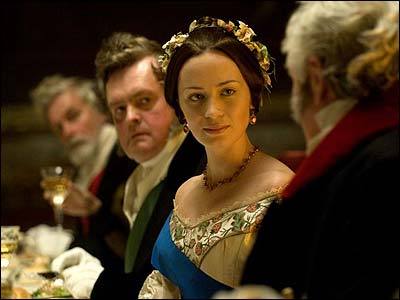The Brits have a love/hate obsession with their royals that is still somewhat a mystery to Americans. We have our celebrities that we love to hate but rarely, if ever, do we follow their story from birth to death. The young princes William and Harry have been speculated about since before they were born. For England, it has been true since the monarchy was installed. And as Americans, we have a limited, cursory view of the woman whose name inspired an era synonymous with propriety and staid relationships.
Seeing Academy Award winning screenwriter Julian Fellowes tender dramatization of Queen Victoria's early years was refreshing, lovely and often amusing. He interpreted a time in her life before she had become comfortable with power. Having been groomed to be nothing but a figurehead, she defied numerous pressures to take her place as the longest reigning English monarch to date.
Emily Blunt (who looks more than a little like HRH) brings an understated, light honesty to the role. She manages to show Victoria's humor, stubbornness, strength, compassion and uncertainty. Rupert Friend takes on the awkward but sweet and sincere Prince Albert of Saxon-Coburg. Their onscreen chemistry enhances the flirtatious nature of their courtship.
Most striking about the film's presentation is how accessible it is. Despite the depictions of excessive wealth, power, inane protocol, the audience is constantly aware that these are just people. It is more than a costume drama. It makes one of history's most notable love affairs as simple as a college sweetheart romance. They are nervous, excited, and have fights, just like any couple. The audience was actually cheering when the two finally become engaged -- even though we all knew the Victoria and Albert were a couple.
Additionally, Jim Broadbent's boisterous King William is very funny, and again underscores that everyone has an ungrateful aunt, a difficult uncle or an annoying cousin. Families will be families, no matter how blue their blood.
The Young Victoria bases itself on true events, including Sir John's vehement wish for a Regency, the attempt on Victoria's life and Victoria and Albert's adjoining desks. Of course, much of the dialogue is speculation, but Fellowes embeds so much that we cannot help but fall in love with the royals, just like any Brit.



No comments:
Post a Comment